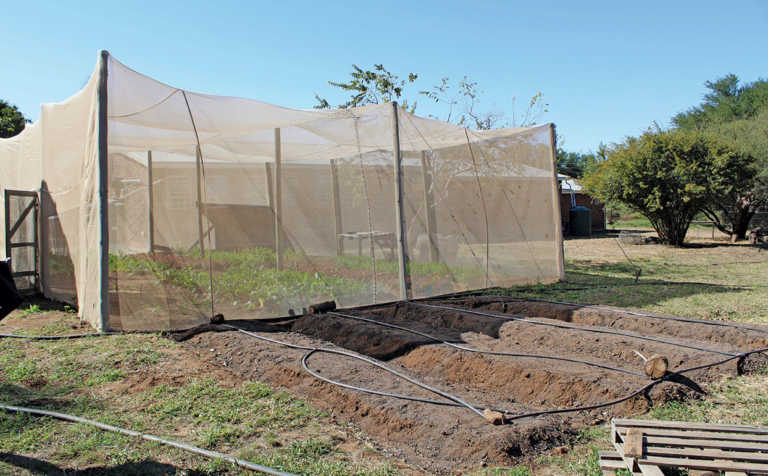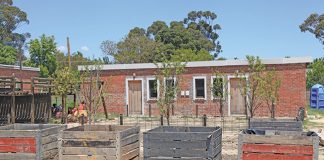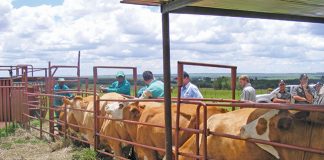
Photo: Lindi Botha
Hoedspruit Hub Agricultural Training Centre in Mpumalanga is a social enterprise that provides training courses for commercial farms, as well as community upliftment and poverty alleviation programmes.
Carien Taute, the business manager, says: “We apply commercial strategies to improve the financial, social and environmental well-being of the communities we’re in. We thus aim to maximise social impact alongside profits for our external shareholders.”
Anri Manderson, the social enterprise manager, adds that the difference between an NGO and a social enterprise is that the latter must be run as a profitable business that can sustain all the projects.
“The commercial side of the business that trains farmworkers ensures that we can carry on with our social development side.”
Social development activities include a youth programme to introduce people between the ages of 14 and 35 to the agriculture sector and address their skills gaps; a scholarship and mentoring programme for high school pupils; and a variety of agroecology programmes.
The aim of the commercial training programmes is to increase the resilience of farming operations through high-quality, sector-appropriate, customised training that develops people and invests in local communities and economies through skills development.
The Hub is housed in a former farm school started by the previous owners of Bavaria Fruit Estates in Hoedspruit. When the Department of Basic Education announced that the school would be closed, some farmers had the vision to establish a training centre to serve the area’s farmers and simultaneously develop small-scale farmers.
The Hub was started in 2016 by three commercial farm enterprises: the Landman Group, Blydevallei Boerdery, and Bavaria Fruit Estates. These own 49% of the enterprise, while 51% is held by the Hoedspruit Hub Trust.
The latter provides bursaries for children from surrounding communities to attend private schools. Hoedspruit Hub is a Level 2 BEE company.
Commercial business
The commercial side of the business provides training to upskill farmworkers, an aspect with which many local farmers experience problems.
An app is also being developed that supervisors can use to evaluate skills gaps.
A major problem, according to Taute, is that farmworkers struggle in the step up from supervisor to junior manager.
“We’ve noticed that many training programmes lack soft skills training. We’ve had to develop modules that include things like problem solving and communication management.
“People who’ve been picking fruit for 10 years have the knowledge to do that job, but when they go into management they have to consider the whole picture, think critically about where they are in the process, and communicate to their team what needs to be done.
They have to understand the problem-solving process and get the best from the workers they’re managing.”
Manderson says that when the course commences, trainers often identify additional gaps in students’ knowledge.
“We’re often dumbfounded at how little understanding there is of basic maths. Originally we thought it was something that could be covered in a day, but we’ve ended up spending a week on teaching trainees how to do basic sums to work out things like trees/ha and multiplying quantities of chemicals.
“The level of education and literacy depends on which school trainees have been to. Some have finished matric, yet can’t perform the most basic maths. The schooling system has failed the people.”
Manderson adds that when the same terminology is used repeatedly on a farm, it often appears as if the concept behind it is understood, but this is not always the case.
“Trainees have just learnt the word. So their level of understanding of the business must be tested before training can start.”
The programme employs games that teach basic business skills by giving trainees a model of a farm on which to build the business. This helps them think differently about the farm and the requirements of the business, and to see the whole picture.
Pieter Scholtz, owner of Blydevallei Boerdery, says that in his experience, training programmes often appear to cover the right content, but it’s difficult to gauge how much the attendees have understood.
“People can be empowered to do great things through proper training. We have many examples of labourers who’ve been given the right tools to succeed and are now junior farm managers in charge of 100ha of citrus.
“Through training, we’ve realised that the common perception that labourers can’t rise to higher positions because they don’t have skills is wrong. It was an eye-opener to realise just how capable people were once they’d been given the right training.”
Social development
The social development side of the Hub includes a school programme and agroecology for entrepreneurs. The latter is aimed mostly at unemployed youth and lasts three months.
“We work with NGOs in the rural areas to peform a kind of audit to see what skills are needed to enhance food security in the community,” explains Manderson.
The Hub teaches agroecology principles as a means for the unemployed to create low-cost farms. Agroecology is a farming approach that includes integrated pest management and natural or organic farming practices.
“Organic produce is seen as something only for the middle class, but small-scale and subsistence farmers benefit the most from organic farming as input costs are lower. If you consider the concept behind seed-saving and mulching, for example, it becomes clear that organic farming is a cheap method of producing good-quality, nutritious food.”
Manderson believes that agroecology is a way to combat food insecurity. “Your input costs are next to nothing because you have your own seed bank, make your own compost, and use the materials around you.”
The Hub has a demonstration garden that is used for training purposes. Everything is done in such a way that a small-scale farmer with few resources can duplicate it.
“We show people that they don’t need huge amounts of money to put up a farm. We identify all the issues they might encounter and provide solutions. People are also welcome to come back at any time if they have problems, and we find a way forward.”
The Hub implements no fewer than 11 low-cost technologies developed by the University of Johannesburg. It is also investigating the costs and benefits of bat houses and worm farms.
The centre has off-take agreements with supermarkets and restaurants in the area to buy produce from the demonstration garden and from former trainees who have their own farms.
“There is a huge need for fresh produce in this area. We can’t keep up with the demand, so there’s definitely scope for more small-scale farmers to get going as there is a market for them,” says Manderson.
The Hub also runs a bursary programme to enable children aged eight to 11 to attend private schools. This year, 16 children are part of the programme.
“We put them in boarding school, so they’re in an environment conducive to learning. We see them weekly and monitor their progress. Although they’re not forced to go into an agricultural direction after school, it would be ideal as we’d want to employ them on shareholders’ farms and empower them further,” says Manderson.
Email Hoedspruit Hub at [email protected], or phone 072 055 9382.











